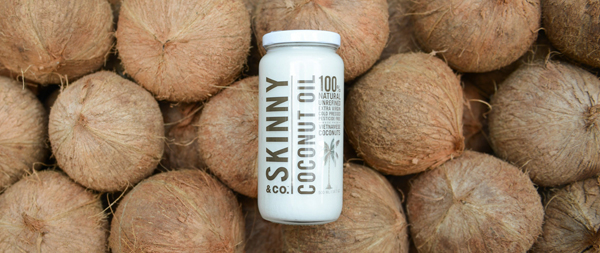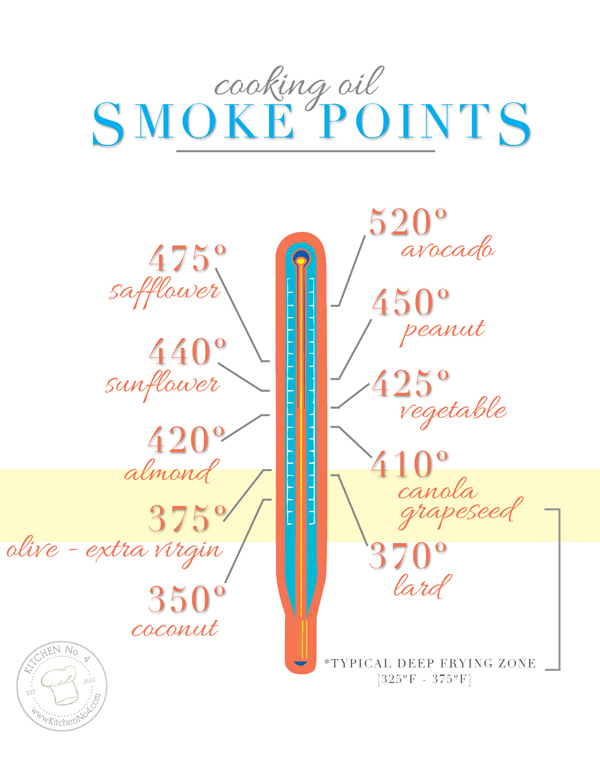The tide seems to be slowly shifting away from demonizing fat. While my family doctor admits my cholesterol is “so good it isn’t even on [her] chart,” she still isn’t comfortable with the fact that I cook with lard. Coconut oil and olive oil, however, are much more acceptable fats for food preparation. Fat is not unhealthy; it supplies energy, helps us feel more full, balances blood sugar, promotes cell growth, decreases inflammation throughout the body, and regulates hormones.
Not all fats are equal, though. Trans fats, or “hydrogenated” fats, have been considered contraband at my house for years. In addition to lard, coconut oil and olive oil are staples in my kitchen. The question of which to use for a specific recipe is more complicated than just the ingredient list. There is a bit of a science to cooking (and shopping) that can help you ensure that the recipes you use provide the full nutritional benefit to your family and do not create unintended health consequences.
Why the Smoke Point is So Important
When fats or oils reach a certain temperature, they begin to break down and lose nutritional value and flavor. At this point, called the smoke point, carcinogenic oxygen radicals are also generated. Recipes need to be evaluated by comparing the oils used with the temperature at which they are prepared.
Many of my favorite vegetable dishes call for roasting temperatures of 350-425 degrees Fahrenheit. Canola, unrefined olive oil, and shortening all have smoke points lower than 350 degrees. While olive pomace oil and extra light olive oil have a higher smoke point, it is commonly suggested that olive oil tends to be better cold rather than heated. Refining the oil can change the smoke point, but the process of refining the oil may also impact the oil’s stability both in smoke point and in shelf life.”Refined olive oil” has been chemically treated and olive pomace oil is extracted through solvents and heat. The different smoke points for different forms of olive oil are known, but coconut oil has not been as popular as long and there is less regulation in how it is extracted and sold.
Virgin vs. Refined
Like olive oil, “refined coconut oil” is bleached and deodorized. “Virgin coconut oil” has two processes of extraction, but even the “Gold Label® Standard” of extraction includes some heating. Raw coconut oil that is “cold pressed” is often centrifuge-extracted before pressing which heats the coconut oil through friction. I recently met Indianapolis-based Skinny and Company coconut oil producers who guarantee that they never allow the coconuts to be heated above room temperature. Their statements about not allowing anything but coconuts in their coconut oil, not using any chemicals, etc. started me on this research regarding production of different oils. They provided me with a jar to try and review, but I cannot imagine purchasing any other coconut oil now. Just melting a small portion of coconut oil in my hand, I can feel which oils have allowed something other than coconut into their jars.
The Demonization of Saturated Fat
While “saturated” might sound like a bad thing, in reference to fat it simply means that there are hydrogen atoms between the carbon atom chains. It has a bad rap, but not everyone agrees with the standard dietary suggestions. I am certainly skeptical as my energy, mood, and health have improved as I eat more animal protein and coconut oil. Coconut oil is a saturated fat, meaning it is solid at room temperature, has a longer shelf life, and is more stable and less susceptible to the breakdown caused by cooking it. Olive oil is a monounsaturated fat, but the more I read on saturated fats v. polyunsaturated fats v. monounsaturated fats, the more conflicting information I find. If you are familiar with the French Paradox and the amount of butter, a saturated fat, in the French diet, you can understand why I am not as convinced as my doctor that it is a bad thing.
If saturated/unsaturated wasn’t confusing enough, you can also analyze a fat by the length of the carbon atom chains it contains. Short and medium chain fatty acids are absorbed by our bodies and converted into energy more easily. Fats that are solid at room temperature, saturated fats, tend to have longer fatty chains than those fats that are liquid at room temperature, like fish oil and olive oil. While coconut oil is a solid at room temperature, it is a medium-chain fatty acid rather than a long-chain fatty acid, making it easily absorbed and converted to energy in our bodies. I have found that a teaspoon of coconut oil on mornings when I am dragging has been helpful.
How to Make Fats Part of Your Healthy Diet
I believe fats and oils are an important part of a healthy diet, although not all medical professionals will likely agree with me. I am learning just how important the labels of “virgin”, “refined”, etc. can be, and it is most important to me to find products that are pure (without added chemicals, bleaching, or deodorizing) and as minimally processed as possible. I am learning that not all recipes take smoke point into account, but it is important that I do so for my family.
With so much “information” on the internet, television, etc., it is essential that you are the advocate for your family and make the best choices that you can and be open to continuing to learn. Primarily, we are using olive oil for dressing and food prep that requires little to no heat, and we are using coconut oil for most of our baking, although I am adjusting the temperature on some of my recipes.
Also Read:
Add Full-Fat Dressing to Your Salad to Make it Healthy
Coconut Sugar is Nutritionally Superior to Other Sugars
This is a sponsored post; Brooke Randolph works as a brand ambassador for Skinny and Company.
images via shutterstock, skinny and company, kitchen no. 4



